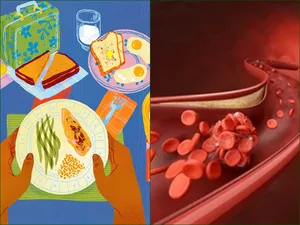Consuming over 22 per cent protein daily may clog your arteries: Study

Consuming excessive dietary protein might increase atherosclerosis risk, researchers have discovered. A study combining small human trials with experiments in mice and cells in a Petri dish showed that consuming over 22 per cent of dietary calories from protein can lead to increased activation of immune cells that play a role in atherosclerotic plaque formation, driving the disease risk. The study also revealed that the amino acid leucine seems to have a disproportionate role in driving the pathological pathways linked to atherosclerosis.
“Our study shows that dialing up your protein intake in pursuit of better metabolic health is not a panacea. You could be doing real damage to your arteries,” said Babak Razani, Professor of cardiology at University of Pittsburgh School of Medicine.
The findings are published in the journal Nature Metabolism. The research delves deeper into the potential mechanism and its relevance to the human body. The study is relevant in hospital settings, where nutritionists often recommend protein-rich foods for the sickest patients to preserve muscle mass and strength.
The potential for this type of mechanistic research to inform future dietary guidelines is quite exciting,” Razani said.
The research raises concerns about the overreliance on protein for long-term health. It also suggests differences in leucine levels between diets enriched in plant and animal protein might explain the differences in their effect on cardiovascular and metabolic health.
The study highlights the importance of balanced meals that won’t inadvertently exacerbate cardiovascular conditions, especially in people at risk of heart disease and vessel disorders. This research could start a conversation about ways of modifying diets in a precise manner that can influence body function at a molecular level and dampen disease risks.
In summary, excessive dietary protein could increase atherosclerosis risk, and the amino acid leucine seems to have a disproportionate role in driving the pathological pathways linked to atherosclerosis. This finding could influence future dietary guidelines and raise concerns about the overreliance on protein for long-term health.









